An In-Depth Look at Addictive Personalities
The concept of an 'addictive personality' is often discussed in popular culture and mental health discussions, yet it remains a complex and sometimes misunderstood idea. While it is not an official psychiatric diagnosis, the term is used to describe a range of behavioral traits and environmental factors that may predispose individuals to addictive behaviors. In this article, we explore what defines addictive behavior, the traits linked to a presumed addictive personality, and the scientific insights into the psychological and genetic influences that shape addiction vulnerability. We aim to unpack myths, examine signs and symptoms, and offer guidance on how individuals can assess their own risk, emphasizing a nuanced understanding over stereotypes.
Defining Addictive Behaviors and Recognizing Warning Signs
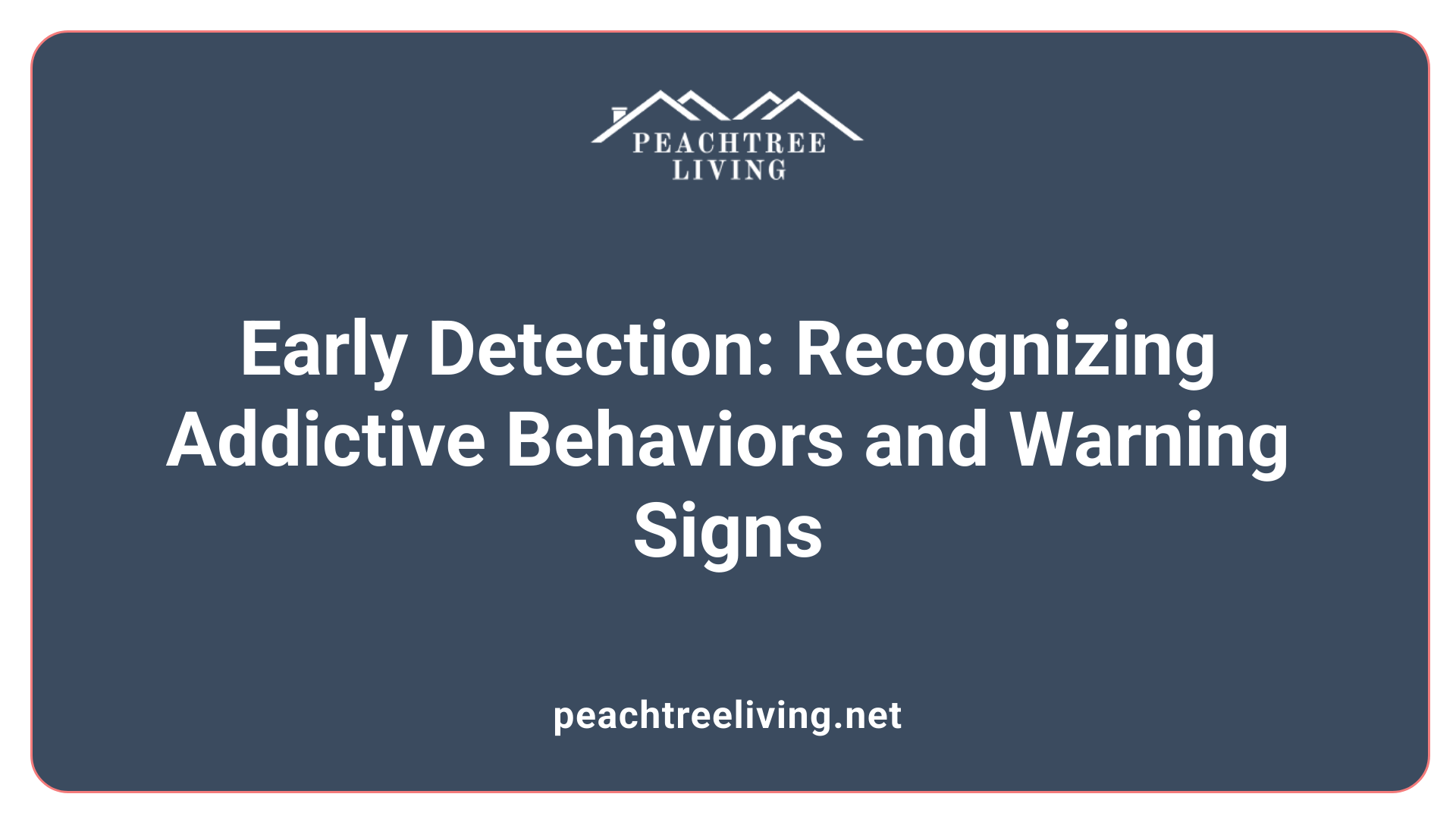
What constitutes addictive behavior?
Addictive behavior involves compulsive engagement in certain activities or substance use, even when these behaviors lead to negative or harmful consequences. These can range from substance misuse—such as alcohol, drugs, or nicotine—to behavioral addictions like gambling, internet gaming, social media usage, sexual activities, exercise, or overeating. What sets addictive behaviors apart is the persistent and often uncontrollable urge to partake despite adverse effects, including physical health issues, damaged relationships, legal or financial troubles.
Recognizing these behaviors early can be crucial for recovery. Common signs include intense cravings, gradual increase in the behavior to achieve the same level of satisfaction (tolerance), and withdrawal symptoms when the activity is reduced or stopped. Individuals may also struggle with a persistent inability to control their engagement, experiencing a preoccupation with the activity or substance. While the development of addiction is multifaceted, it is treatable through various methods such as therapy, support groups, harm-reduction strategies, and lifestyle changes. Early identification of these behaviors allows for timely intervention, supporting healthier choices and overall well-being.
Signs and symptoms of addiction
Addiction manifests through a broad spectrum of behavioral, physical, emotional, and mental signs. Behavioral indicators often include a compulsive need to engage in specific activities, difficulty stopping despite attempts, neglect of personal and professional responsibilities, secretive actions about the activity, and engagement in risky behaviors. These can lead to significant social and financial problems.
Physical symptoms associated with addiction may be observable through rapid weight fluctuations, abnormal pupil size, unexplained bruises, physical signs of intoxication or withdrawal, and poor hygiene. Emotional and psychological signs are equally telling and include persistent cravings, increased anxiety or agitation, mood swings, preoccupation with the addictive activity, and feelings of helplessness or powerlessness.
Furthermore, addiction can cause severe disruption in mental health, compounding issues such as depression, anxiety, irritability, and low self-esteem. The persistent pattern of these signs indicates an underlying problem that affects an individual’s functioning and quality of life. Recognizing these symptoms, especially when they cluster together and impair daily routines, is crucial for seeking help and initiating recovery.
| Aspect | Signs & Symptoms | Additional Context |
|---|---|---|
| Behavioral | Craving, loss of control, secretiveness, risky acts, neglect of responsibilities | Behaviors become compulsive and difficult to stop despite consequences |
| Physical | Weight changes, signs of intoxication, withdrawal symptoms, poor hygiene | Physical health can deteriorate from ongoing substance or activity use |
| Emotional & Mental | Anxiety, agitation, mood swings, preoccupation, feelings of helplessness | Mental state fluctuates, often reinforcing addictive behaviors |
| Social & Financial | Relationship difficulties, financial problems, legal issues | Social impacts are common and often exacerbate addiction severity |
Understanding these patterns helps individuals and caregivers identify problematic behaviors early, paving the way for effective intervention and support.
Common Traits and Characteristics of an Addictive Personality
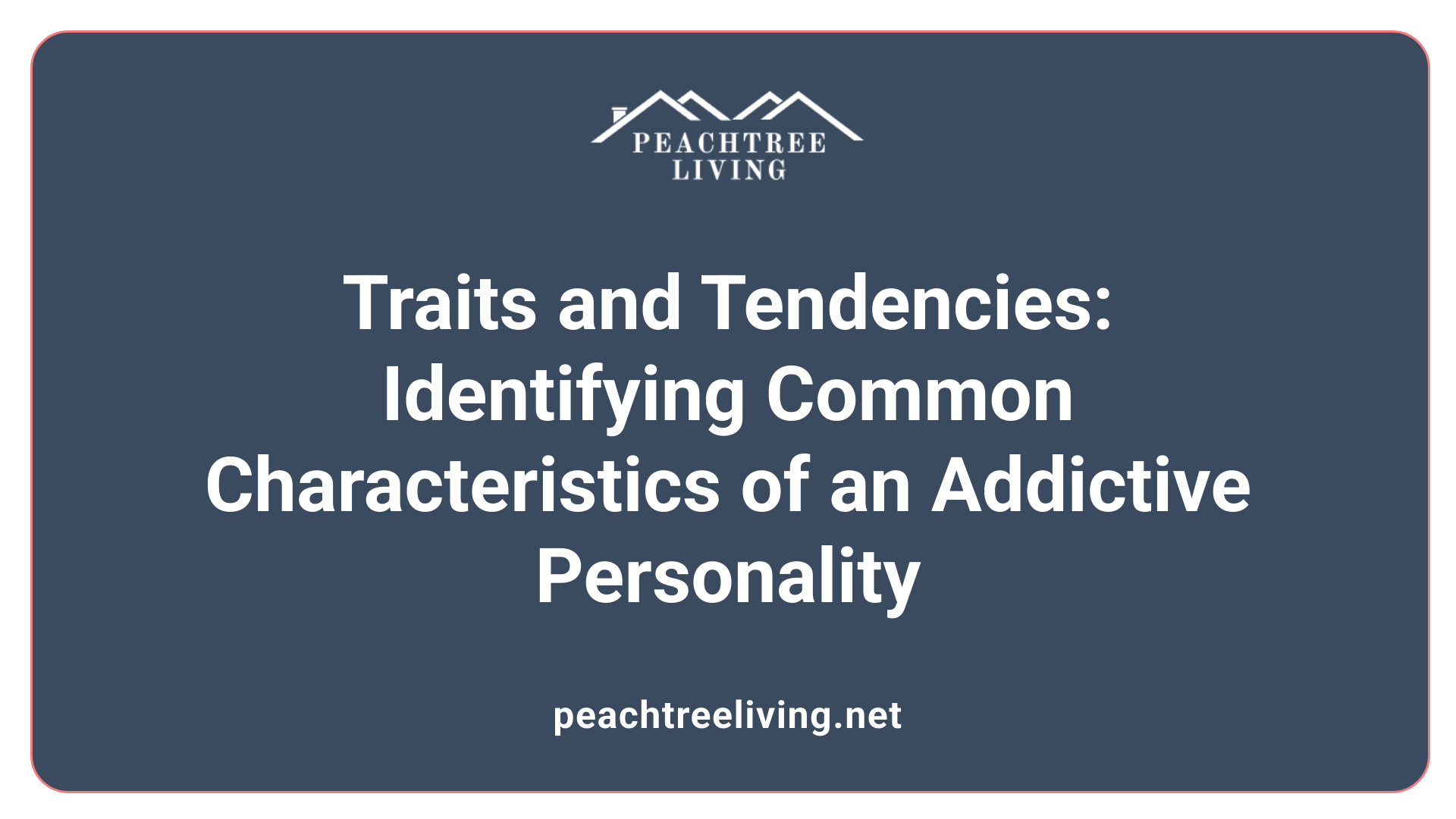
What are the traits and characteristics of an addictive personality?
Individuals described as having an addictive personality often display a range of traits that may increase their susceptibility to developing addiction. These include impulsivity, a tendency to seek excitement and new experiences, and difficulty controlling impulses. They might also exhibit obsessive tendencies, compulsive behaviors, and a high need for stimulation.
One prominent trait is sensation-seeking—an inherent desire for novel, thrilling experiences that can lead to experimenting with risky behaviors or substances. Such individuals often have poor coping skills, low self-esteem, and mood swings, making them more vulnerable to using substances or engaging in addictive behaviors to manage their emotional states.
Craving and obsessive thoughts are common, with some individuals fixating on substances or behaviors that provide subsequent pleasure or relief. This obsession can lead to compulsive use despite negative consequences, such as health issues or social problems.
Importantly, these traits do not guarantee addiction but instead signify a higher likelihood or vulnerability. Addiction is a multifaceted condition influenced by neurological, genetic, environmental, and psychological factors.
Traits such as neuroticism, emotional instability, and risk-taking behaviors are often interconnected. For example, impulsivity combined with anxiety or depression can increase the likelihood of self-medicating with drugs or alcohol.
Habitual behaviors, including excessive gambling, binge eating, or compulsive internet use, are typical among those with an addictive personality profile. These behaviors are driven by a reward system in the brain—especially involving dopamine—that reinforces seeking pleasure or relief.
Effective management and treatment of addiction for individuals with these traits often involve psychological therapies, such as cognitive-behavioral therapy (CBT), which address thought patterns, emotional regulation, and behavioral change. Addressing underlying issues like low self-esteem, stress, or trauma is also crucial.
While traits like impulsivity or risk-seeking contribute to vulnerability, they are not determinative. Many with these traits lead healthy lives, emphasizing the importance of a holistic approach that considers both behavioral tendencies and biological factors.
In summary, an addictive personality is characterized by behaviors and traits that predispose someone to develop addictive behaviors. These include an obsession with obtaining pleasure, impulsivity, sensation-seeking, mood instability, and behavioral compulsions. Recognizing these traits can help individuals and clinicians develop strategies to mitigate risks and promote healthier decision-making.
Dispelling Myths and Misconceptions About the 'Addictive Personality'
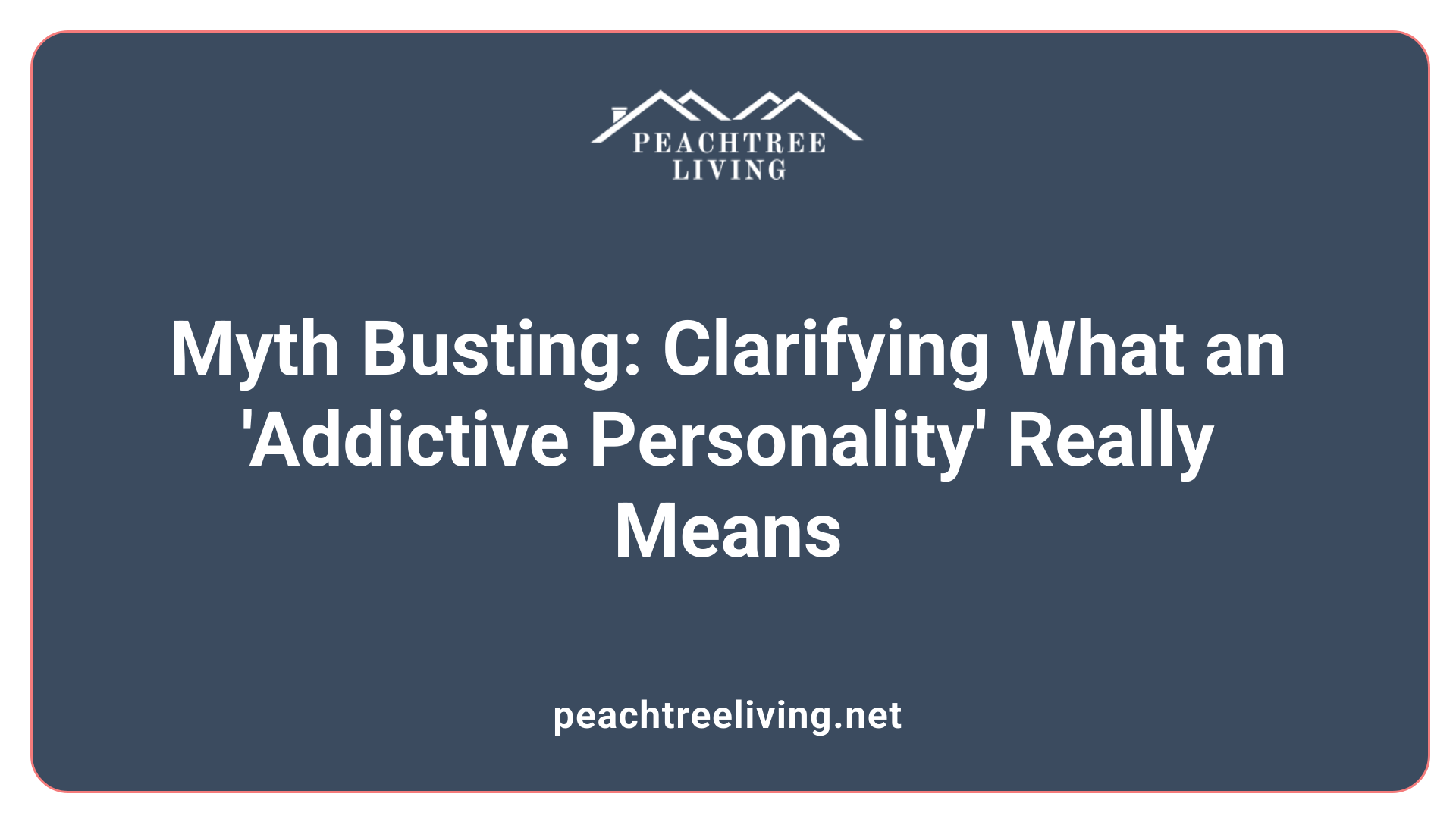
Are there myths or misconceptions about addictive personalities?
Yes, there are several widespread myths and misconceptions about the idea of an "addictive personality." The most common false belief is that a specific personality type guarantees addiction—implying that if someone exhibits traits like impulsivity, risk-taking, or neuroticism, they are destined to become addicted. However, this idea oversimplifies the complex nature of addiction.
Research indicates that addiction is a multifaceted disorder influenced by a combination of genetic, environmental, and mental health factors rather than personality traits alone. For instance, genetics may account for approximately 40-60% of addiction risk, while environmental influences such as trauma, peer pressure, and social support heavily impact outcomes.
A prevalent misconception is that addiction results solely from a lack of willpower or moral failure. In reality, addiction involves brain changes affecting reward pathways and self-control mechanisms. These neurobiological alterations make quitting difficult, even for individuals with strong personalities or high motivation.
Further myths include the belief that one must hit "rock bottom" before seeking help, or that recovery is an immediate process. Both are false; effective treatment often requires long-term therapy, medication, and ongoing support, with setbacks like relapse being common but manageable.
Supporting loved ones with addiction through compassion, understanding, and evidence-based interventions is far more effective than assigning blame or adopting dismissive attitudes. Recognizing addiction as a medical illness helps reduce stigma, encourages timely help-seeking, and promotes more effective treatment strategies.
In summary, while traits such as impulsivity and neuroticism can increase vulnerability, they do not determine destiny. The concept of an "addictive personality" remains a myth—addiction is a complex condition that requires nuanced understanding and a compassionate approach.
The Psychological and Genetic Underpinnings of Addiction
What psychological and genetic factors influence addictive personalities?
Addiction is a multifaceted condition influenced by an interplay of psychological traits and genetic predispositions. Psychological factors that shape susceptibility include certain behavioral and emotional tendencies. Individuals with traits like impulsivity, sensation seeking, and difficulty with impulse control are often more prone to addictive behaviors. These traits can make it harder for a person to resist engaging in harmful activities such as drug use, gambling, or compulsive eating. Additionally, susceptibility to stress, anxiety, depression, and early traumatic experiences can influence brain functioning related to emotion regulation and reward processing. These emotional vulnerabilities may predispose individuals to seek relief through addictive behaviors.
On the genetic side, research indicates that heritability plays a significant role in addiction, with estimates varying from approximately 39% to 72% depending on the substance. Several genes have been identified as influencing addiction risk. For example, polymorphisms in MAOA, CHRNA5, and OPRM1 genes affect neurobiological pathways that regulate neurotransmitters like dopamine, which is central to the brain's reward system. These genetic variations can alter receptor function, metabolism of addictive substances, or the way organisms respond to stimuli.
Furthermore, gene-environment interactions are particularly important. Childhood adversity, trauma, or chronic stress can modify genetic vulnerability through epigenetic mechanisms—changes in gene expression without altering the DNA sequence itself. Such environmental influences can heighten susceptibility by affecting brain development and the functioning of neural circuits involved in impulse control, reward, and emotional regulation.
Multiple genes contribute to addiction vulnerability in a polygenic manner, impacting diverse neurobiological pathways. For example, genes influencing dopamine regulation can affect sensation seeking and reward sensitivity, while others may impact stress response systems. These variations help explain why some individuals are more likely to develop addiction despite similar environmental exposures.
In conclusion, addiction arises from a complex interaction between psychological tendencies, genetic makeup, and environmental factors. No single factor determines addiction on its own. Instead, it is the combined influence of traits like impulsivity and emotional instability, combined with genetic predispositions and life experiences, that shape an individual's susceptibility. Addressing both psychological and genetic components is critical in understanding, preventing, and treating addiction effectively.
| Aspect | Influence | Details |
|---|---|---|
| Psychological Traits | Impulsivity, sensation seeking, stress susceptibility | Traits that can increase the likelihood of engaging in addictive behaviors. |
| Mental Health Factors | Anxiety, depression, trauma | Vulnerabilities that can lead to self-medication and increased addiction risk. |
| Genetic Factors | Heritability, specific gene variants | Variations in genes like MAOA, CHRNA5, and OPRM1 that influence brain pathways related to addiction. |
| Gene-Environment Interaction | Trauma, childhood adversity | Environmental stresses that can modify gene expression through epigenetics, enhancing risk. |
Overall, addiction is best understood through this dynamic interplay rather than a singular cause. Recognizing these factors allows for more tailored preventive and therapeutic strategies.
Behavioral, Physical, and Emotional Signs of Addiction
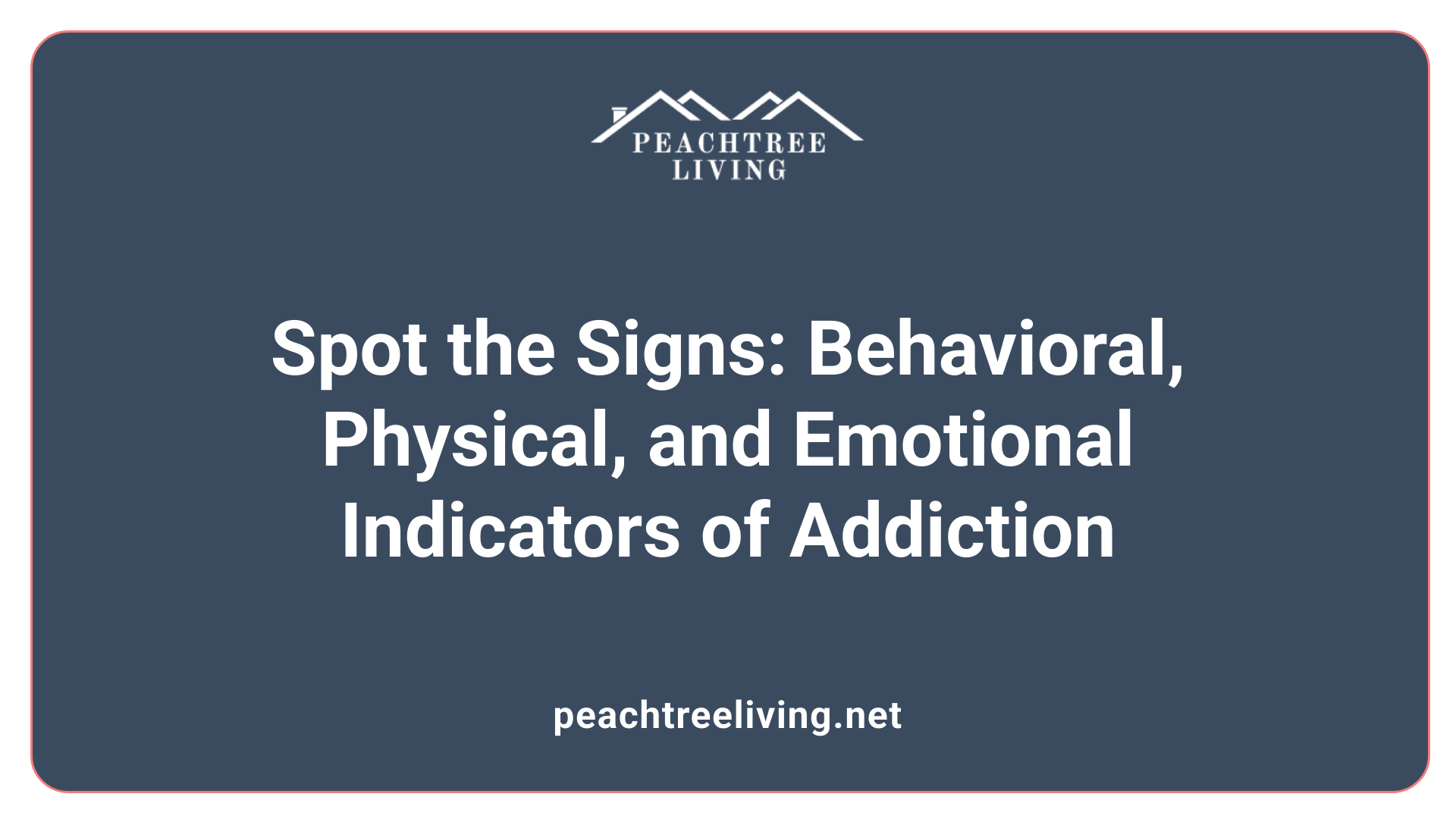
What are the signs and symptoms associated with addictive behaviors?
Addiction can present itself through a variety of observable signs and symptoms across behavioral, physical, emotional, and mental domains.
Behavioral signs often include a compulsive need to perform specific activities, such as drug use, gambling, or excessive internet or social media engagement. Individuals may struggle to control their behavior, often continuing despite adverse consequences. They might neglect daily responsibilities, show secretive behaviors to hide their activities, and experience mood swings or irritability. Risk-taking behaviors, such as reckless driving or unsafe sexual practices, can also be common. Additionally, addiction may lead to social withdrawal, relationship problems, or financial difficulties.
Physical symptoms can be more subtle but are important indicators. These may include rapid weight loss or gain, dilated or constricted pupils, unexplained bruises or injuries, and signs of intoxication or withdrawal like tremors, sweating, or tremors. Poor hygiene, sleep disturbances, and changes in appearance are also notable. For example, someone experiencing alcohol withdrawal might have tremors or sweating, while substance intoxication can cause altered consciousness.
Emotional and psychological symptoms are equally telling. Cravings for substances or behaviors, intense anxiety, agitation, or depressive episodes often accompany addiction. Individuals might exhibit mood swings, irritability, or feelings of helplessness and powerlessness to control their impulses. Obsessive thoughts about engaging in addictive behaviors or substances can dominate their mental life, leading to preoccupation. Feelings of guilt and shame are common, and in some cases, individuals may feel disconnected from reality or blame others for their problems.
Overall, addiction manifests through persistent, maladaptive patterns that interfere with daily functioning and overall well-being. Recognizing these signs early can facilitate intervention and support recovery efforts.
Below is a summary table of common signs associated with addiction:
| Category | Signs and Symptoms | Additional Notes |
|---|---|---|
| Behavioral | Compulsiveness, control issues, secrecy, neglect of responsibilities, risky acts | Examples include drug use, gambling, internet overuse |
| Physical | Weight changes, dilated pupils, bruises, intoxication signs, withdrawal | Can be observable and specific to substances or behaviors |
| Emotional/Psychological | Cravings, anxiety, mood swings, feelings of helplessness, preoccupation | Often reflect underlying dependency and emotional distress |
Addressing these signs is crucial for early intervention, which can significantly improve treatment outcomes. It is also essential to seek professional help if addiction symptoms are impacting daily life.
Implications for Mental Health and Behavior Management
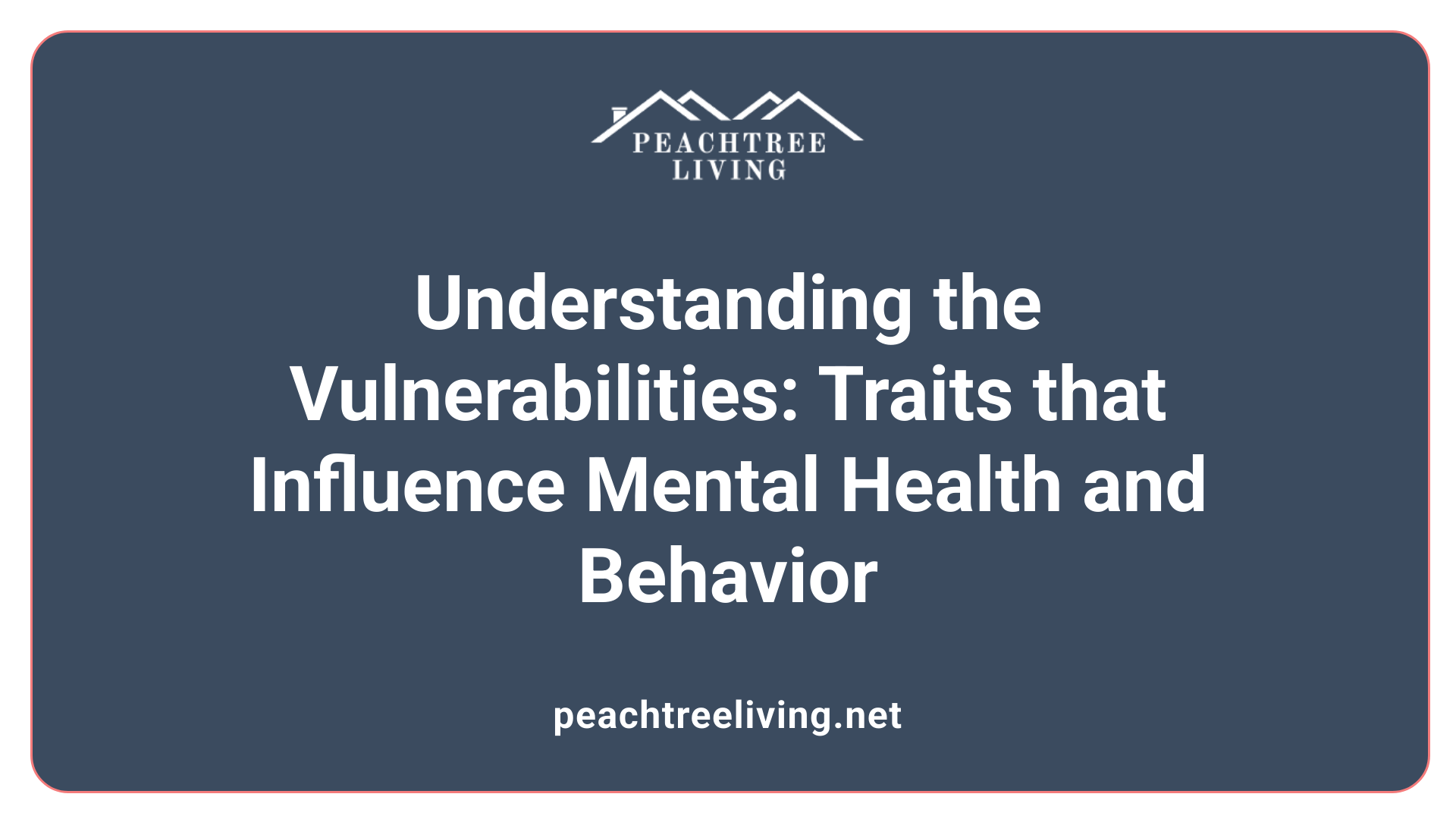
What are the implications of an addictive personality for mental health and behavior management?
An addictive personality involves a pattern of traits that can make an individual more vulnerable to developing addictive behaviors. Although it is not a formal diagnosis, traits such as impulsivity, thrill-seeking, emotional instability, and difficulty with self-regulation are commonly observed in this personality profile.
These characteristics can have significant impacts on mental health. For example, impulsivity and sensation-seeking may increase the likelihood of trying drugs, gambling, or engaging in risky activities. Emotional traits like anxiety, depression, or neuroticism can also predispose individuals to use substances as a way to self-medicate, which can worsen their mental health conditions over time.
People with these traits often struggle with controlling their behaviors and may find themselves trapped in cycles of compulsive activities. This can lead to health problems, strained relationships, and a decrease in overall quality of life. The reliance on substances or harmful activities as coping mechanisms can further exacerbate mental health issues, creating a challenging cycle difficult to break.
Understanding the implications of an addictive personality helps in early identification of at-risk individuals. Recognizing traits like poor impulse control, risk-taking behaviors, and emotional volatility enables mental health professionals to tailor interventions.
Effective strategies include cognitive-behavioral therapy (CBT) and dialectical behavior therapy (DBT), which target maladaptive thought patterns, enhance emotional regulation, and bolster coping skills.
Additionally, lifestyle modifications, stress reduction techniques, fostering social support, and building self-esteem are crucial components of behavioral management.
Early intervention can prevent escalation into more severe addiction or mental health disorders. It highlights the importance of developing a tailored approach that addresses both behavioral traits and underlying emotional challenges.
Overall, acknowledging the implications of an addictive personality underscores the importance of holistic treatment plans. These strategies aim to reduce vulnerability, improve emotional resilience, and promote healthier decision-making, ultimately leading to better mental health outcomes.
By focusing on behavioral management and mental health support, individuals with addictive personality traits can learn healthier ways to cope with stress and cravings, reducing the risk of addiction and its associated consequences.
Navigating the Complex Landscape of Addiction and Personal Traits
While the myth of an 'addictive personality' persists, current scientific understanding highlights addiction as a multifaceted condition influenced by a combination of genetic, environmental, and psychological factors. Traits such as impulsivity, sensation-seeking, and emotional instability may increase vulnerability, but they do not predetermine an individual's path to addiction. Recognizing signs and understanding the complex interplay of these factors can empower individuals to assess their own risk and seek appropriate help. Effective management involves comprehensive approaches—addressing behavior, supporting mental health, and understanding personal susceptibilities—rather than relying on simplistic stereotypes. Ultimately, fostering awareness and compassion leads to better support for those vulnerable to addiction, emphasizing that recovery is possible with the right interventions.
References
- Do you have addictive personality traits? - Mayo Clinic Health System
- What Are the Traits of an Addictive Personality? | Do You Have One
- Addictive Personality Disorder: Causes, Risk Factors and Help
- Take the Addictive Personality Quiz - Maryland Recovery
- What Does It Mean To Have an 'Addictive Personality'?
- Addiction And Addictive Personality
- 13 Signs You Might Have An Addictive Personality | BetterHelp
- Is there such a thing as an addictive personality? - BBC
- Genetics: No more addictive personality - Nature

